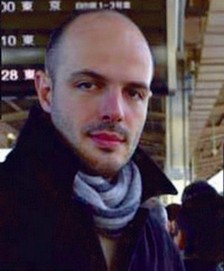
Đuro Živković (1975, Serbia), composer and violinist, studied composition with V. Trajković, P. Lindgren, B. Sørensen, M. Lindberg, M. Davidovski, Esa-Pekka Salonen, J. Dillon, M. Obst, and others. He has written a number of solo, chamber, orchestra, and choral works, as well as several pieces of electro-acoustic music. His works have been performed across Europe and Canada and recorded for a number of radio and television stations. Music by Živković has been commissioned and performed by many ensembles and performers: Trio Fibonacci (Montreal – Brussels), SAMI Sinfonietta, the pre-art ensemble (Zurich), Klangforum Wien, the Stockholm Wind Orchestra, the Sonantza ensemble, SONEMUS (Sarajevo), the Swedish String Orchestra Musica vitae, New Music Ensemble (Belgrade); Anna Larsson (alto), Stephan Würth (piano), Matthias Arter (oboe); the conductors Stefan Schreyer, Majkl Bartotch, B. Tomi Anderson, Biljana Radovanović, Jan Risberg, and others. His piece Morska grobnica (The Sea Tomb) won the 2010 Swedish Grammy Award. His work Asketska beseda (Ascetic Discourse) won the 2012 Mokranjac Award. In 2014, for his composition On the Grounding of the Heart, he received the prestigious Grawemeyer Award.
Major works: Psalmi XIII (Psalms 13, for string orchestra or quartet, 2014), Beli anđeo II (The White Angel 2, for symphony orchestra, 2014), Asketska beseda II (Ascetic Discourse 2, for piano, clarinet, and strings, 2014), Noćna muzika (Night Music, 2014), Asketska beseda (Ascetic Discourse, for avoice and chamber ensemble, 2012), Razmišljaću… (I Shall Think…, 2011), Morska grobnica I and II (The Sea Tomb, for mezzo-soprano and chamber ensemble, 2008–2009), Oko svetlosti sveća (Around the Light of Candles, 2007), etc.
Asketska beseda is a cantata for a vocal soloist and chamber ensemble. The music was inspired by Father Filimon’s contemplative text in the Byzantine compilation Philokalia and represents an attempt on the composer’s part to lend it musical expression in an intimate and rather personal way.
Technically, there are many layers of musical ideas that I wanted to combine: the serene unison chanting of northern Russia, the harmonics of church bells, ison, Byzantine chant ornaments, and other things. In them I found and learned that beauty lies in simplicity, in the unison of simplicity.
Asketske besede are a modern hesychastic hymn of an apophasic character, my personal need to create music that dives deeply into silence and finds there the delight of the heart, music beyond time.
Explaining their ruling, the jury asserted:
‘Asketska beseda, a cantata for a mezzo-soprano and chamber ensemble, is a richly shaped and inherently varied music, featuring multi-directional communication, with not only contemporary tendencies, but also with ancient native and traditional sources of inspiration and musical thought. The spiritual and civilisation circle, defined by Father Filimon’s text from Philokalia, the old Byzantine collection of sacred texts, and evoked by the colouring and treatment of voice and the entire ensemble, comes to life with much innovation, in many layers, thoroughly felt, and delicately. Contemporary means of composition and technique, of which Đuro Živković has sovereign command, stand firmly in the service of his artistic individuality, complete and original expression. Asketska beseda is a piece that constitutes a step forth into the novel and authentic in Serbian as well as European contemporary music.’


